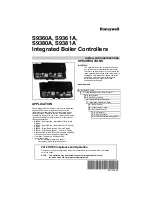
41
LP- 325 REV. 3.3.15
Figure 17
– Horizontal Venting - NOTE: Drawing is meant to demonstrate system venting ONLY.
NOTES:
A. For every 1” of overhang, the exhaust vent must be located 1” vertical below overhang (overhang means top of building structure
and not two adjacent walls [corner of building]).
B. Typical installations require 12” minimum separation between bottom of exhaust outlet and top of air intake.
C. Maintain 12” minimum clearance above highest anticipated snow level or grade (whichever is greater).
D. Minimum 12” between vents when installing multiple vents.
E. 12” minimum beyond air intake.
All vent pipes must be glued, properly supported, and the exhaust must be pitched a minimum of ¼” per foot back to the appliance to
allow drainage of condensate. When placing support brackets on vent piping, the first bracket must be within 1 foot of the appliance and
the balance at 4 foot intervals on the vent pipe. Appliance venting must be readily accessible for visual inspection for the first three feet
from the appliance.
2. VENTING THROUGH AN EXISTING SYSTEM
This appliance may be vented through an existing unused vent system. The inner diameter of the existing vent system is utilized for the
combustion air source. Two methods have been approved for such venting: Concentric Venting Through an Existing System and
Venting as a Chase.
VENT / AIR INLET SIZE
MINIMUM EXISTING VENT / CHASE SIZE
2”
4”
3”
5”
4”
7”
Table 9
– Minimum Existing Vent / Chase Sizing
Summary of Contents for Pioneer
Page 17: ...17 LP 325 REV 3 3 15 Figure 3 Dimensions ...
Page 28: ...28 LP 325 REV 3 3 15 Figure 9 DHW Pack Performance on 199K BTU Models ...
Page 44: ...44 LP 325 REV 3 3 15 Figure 20 ...
Page 47: ...47 LP 325 REV 3 3 15 Figure 22 Internal Wiring Diagram ...
Page 67: ...67 LP 325 REV 3 3 15 Figure 30 Pioneer and Versa Flame ...
Page 68: ...68 LP 325 REV 3 3 15 Figure 31 Pioneer and Versa Flame ...
Page 71: ...71 LP 325 REV 3 3 15 ...
Page 72: ...72 LP 325 REV 3 3 15 ...
















































